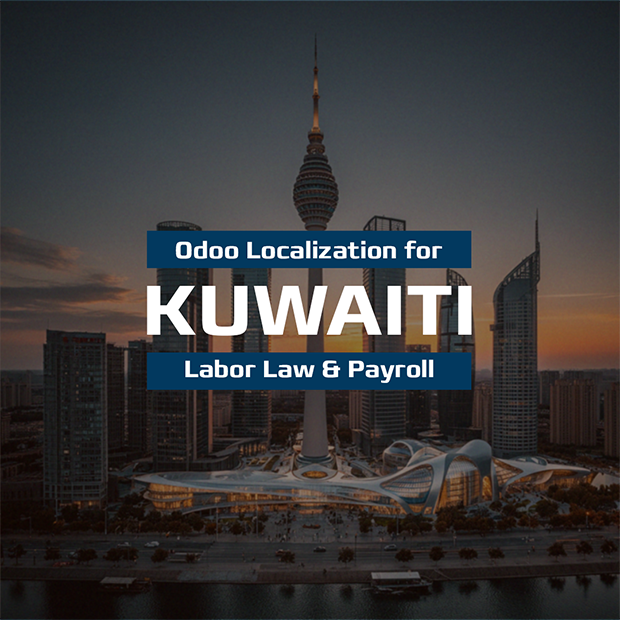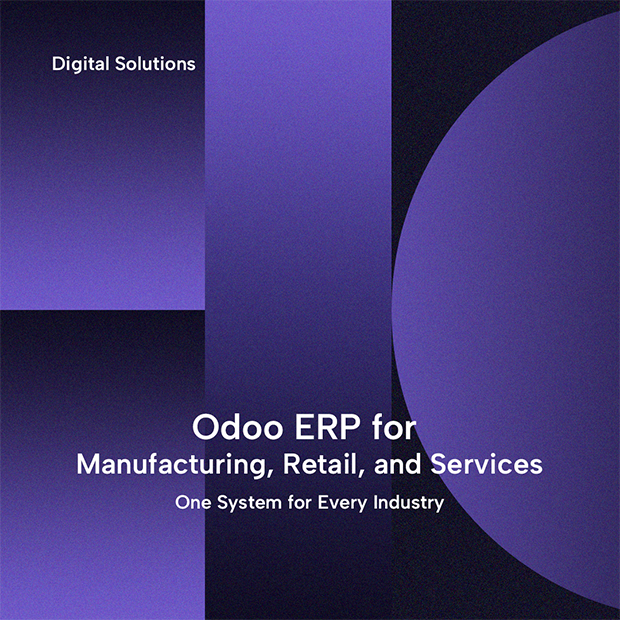Introduction
In today’s globalized business environment, companies that operate across borders must stay compliant with local labour laws and payroll regulations — and the Middle East is no exception. One such jurisdiction is the State of Kuwait, where employers must adhere to the Private Sector Labour Law No. 6 of 2010 (commonly referred to as the Kuwaiti Labour Law) and the associated payroll requirements for private‐sector employees. Meed+2PEO Middle East+2
For businesses using the enterprise resource-planning platform Odoo (including the HR & Payroll modules), it is essential to apply proper localization to handle Kuwaiti labour law and payroll nuances. In this article, we at EUSOL explore how to implement Odoo localization for Kuwait: what the regulatory requirements are, how they translate into system configuration, and best practices for implementation and ongoing compliance.
1. Overview of Kuwaiti Labour Law & Payroll Fundamentals
1.1 Legal framework
The principal law governing private-sector employment in Kuwait is the Labour Law No. 6 of 2010. Meed+1 It applies to all employees in the private sector regardless of nationality. Meed+1 The law sets out rules on employment contracts, working hours, leave, termination, and other HR matters.
Additionally, payroll and social security requirements are governed by separate regulations for Kuwaiti nationals (via the Public Institution for Social Security (PIFSS)) and applicable standards for expatriates (though expatriate workers are often exempt from certain social security contributions). Global Expansion+1
1.2 Key labour and HR dimensions
Some of the key labour law provisions worth noting:
Employment contracts must be in Arabic, and optionally in another language; in case of dispute, the Arabic version prevails. Meed+1
Contracts may be definite‐term (up to 5 years) or indefinite; if performance continues after expiry, the contract becomes indefinite. Meed
Working hours for the private sector: normally up to 48 hours per week for full-time employees. Zimyo HRMS+1 During Ramadan, working hours are reduced. PEO Middle East
Annual leave entitlement: 30 days paid after one year’s service. Global Expansion+1
Minimum wage: As of 2025, the minimum wage for private sector employees (nationals and expatriates) is 75 Kuwaiti Dinars (KWD) per month. Playroll+2Truein+2
Payment frequency: Monthly‐paid employees must receive wages at least once a month. Mercans Global Payroll & PEO+1
End-of-service gratuity / severance pay, termination notice periods, etc., are regulated under the labour law. Global Expansion+1
1.3 Payroll & social security context
For payroll processing in Kuwait, some additional important points:
Personal income tax: Kuwait does not impose personal income tax on employees in the private sector. Truein
Social security: For Kuwaiti nationals, employer contribution to PIFSS is around 11.5% of salary (capped at certain ceilings), and employee contribution about 8%. Expatriates are typically exempt from PIFSS contributions. Global Expansion+1
Overtime: Overtime pay is required when employees work beyond normal hours; for example, on a day off or rest day, an employee must receive 150% of normal pay plus another rest day. Neeyamo+1
Employer must ensure that contracts, payslips, and payroll records comply with local law and authority requirements (e.g., the Ministry of Social Affairs & Labour (Kuwait), MOSAL). Meed
2. Key Payroll & HR Requirements Relevant to Odoo Localization
When configuring Odoo for the Kuwaiti market, you must model the above labour law and payroll requirements so your system computes correct values, generates compliant payslips, handles leaves and terminations correctly, and ensures record-keeping accordingly. Below are the key requirements to capture.
2.1 Contracts & pay structure
The system must allow contract types: definite‐term vs indefinite, with associated expiry logic.
Contract language fields: Arabic contract version is statutory; you may have a second language version for reference.
Salary and wage structure: Base salary must meet minimum wage; system must validate this threshold.
Payment frequency: Usually monthly, but the system should accept other frequencies (though monthly is standard) and ensure at least once-monthly for monthly paid employees. Mercans Global Payroll & PEO
Ability to handle expatriate vs Kuwaiti national distinctions, especially for social security contributions.
2.2 Working hours, overtime & rest days
Modeling of weekly working hours (e.g., 48 hours standard) and automatic reduction during Ramadan.
Define rest day (commonly Friday) logic.
Overtime rules: For work on rest days or holidays, must pay at 150% or more as required. Neeyamo+1
System must capture overtime hours and apply correct rate multipliers.
2.3 Leave entitlements
Annual leave: After one year of service, 30 days paid annual leave. Global Expansion
Public holidays: At least 9 public holidays in Kuwait annually. Global Expansion
Sick leave: Standard provisions apply, and maternity leave: 70 days paid maternity leave and further unpaid leave. Zimyo HRMS+1
Leave accrual: System must accrue and manage leave balances accordingly, including carry‐over rules if applicable.
2.4 Termination, end‐of‐service & gratuity
The system must capture termination notice periods (e.g., 3 months for monthly salaried employees) and compute applicable end-of-service benefits. Global Expansion+1
Gratuity/severance pay calculation logic: For example, 15 days’ pay per year for first 5 years, then one month’s pay per year beyond that (depending on law). Global Expansion
Ability to generate termination settlement reports, and interface with payroll to pay final dues.
2.5 Social security & statutory contributions
For Kuwaiti nationals: employer contribution to PIFSS (e.g., 11.5%) and employee contribution (e.g., 8%) up to certain salary caps. Playroll+1
For expatriates: exempt from PIFSS, but other statutory payroll obligations may still apply.
The system must track contributions, report to competent authorities, and integrate this into payroll calculations.
2.6 Minimum wage and salary compliance
As of 2025, minimum wage for private sector is 75 KWD per month. Playroll+1
The system must validate that salary entries meet or exceed the legal minimum and raise alerts if not.
2.7 Payroll processing period & payslips
Monthly payroll process is predominant; ensures employees are paid at least once per month. Mercans Global Payroll & PEO
Payslips must display salary, allowances, overtime, deductions (including social security contributions) clearly.
Maintain audit trail and archives for statutory compliance and inspections by labour authorities.
2.8 Multi-currency / local currency & reporting
Kuwaiti Dinar (KWD) is the local currency; system must ensure correct currency handling.
Reporting: ability to generate statutory reports as required by MOSAL or other regulatory bodies.
2.9 Multi-entity, multi-work-site capabilities
Many organizations in Kuwait operate multiple branches or legal entities; Odoo must support distinct payroll units (statutory units) under the same group. For example, in Oracle’s documentation they refer to “Payroll statutory units” (PSUs) for Kuwait. Oracle Docs
The system must allow configuration for each legal entity / entity that processes payroll separately and reports accordingly.
3. How to Model These Requirements in Odoo
In this section we walk through how to configure or develop localization within Odoo to support Kuwait labour law & payroll.
3.1 Localization module & configuration
Use or develop a localization module (e.g., “l10n_kw_payroll”) which provides salary rules, structure templates, payslip layouts tailored for Kuwait.
Configure salary rules: base salary, allowances, overtime multipliers, social security contributions, termination/gratuity rules.
Create employee categories: Kuwaiti national vs expatriate – to differ in contributions.
Define salary structure: monthly salary model, minimum wage validation rule implemented at salary structure or contract level.
Define contract types: definite term (with expiry date) and indefinite; include fields for Arabic contract version, second language.
Configure working time: Standard 48 hours/week; define Ramadan schedule. Overtime rule sources based on rest days/holidays.
Configure leave types: annual leave (30 days after one year), sick leave, maternity leave; define accrual method (e.g., after 1 year).
Configure termination/resignation process: include notice period fields, compute end‐of‐service gratuity based on length of service and last salary.
3.2 Payroll processing workflows
Ensure payroll scheduler: process monthly runs; for multi‐entity, set up each legal entity’s payroll job.
Payslip generation: populate payslip template with all components (base salary, allowances, overtime, deductions, contributions, termination lumps).
Overtime computation: set rules for 125% or 150% as per rest day/holiday; system must detect if worked on rest or holiday and adjust accordingly.
Social security deduction: for Kuwaiti nationals, compute employer and employee contributions per salary caps; for expatriates, skip PIFSS but still allow other statutory deductions if any.
Gratuity/End‐of‐service calculation: include rules triggered at termination. Possibly as separate salary rule “Gratuity Settlement” to produce final payment.
Reporting and archiving: Create statutory report templates to export or submit to MOSAL or internal audit.
3.3 Integration & reporting
Integrate with HR module: employees, contracts, job roles, assignment of compensation.
Multi-company / multi-entity set up: In Odoo’s multi-company environment, each legal entity in Kuwait must have its payroll journal, account, sequence, and salary structure.
Localization of language and formatting: Arabic language support for contract, payslip, reports; right-to-left alignment where required.
Minimum wage alerts: Implement server action or constraint to check salary entries < 75 KWD & warn administrator.
Audit log: Use Odoo’s logging/tracking to maintain history of salary changes, contracts, terminations for compliance purposes.
Data export: Prepare for payroll audit, provide data export in formats required by local authorities (e.g., PDF payslips in Arabic, Excel report of contributions).
3.4 Customisation considerations
Branching: If the company has operations across other GCC countries, the localization module should be modular so you can plug in Kuwait logic while keeping other country localizations clean.
Parameterization: For example, minimum wage value may change; better to store these values in configuration settings rather than hard‐coding.
Future law changes: Build flexibility for future amendments to labour law (e.g., notice period changes, gratuity formula changes).
User interface: Provide user‐friendly forms for HR to maintain contracts, assign leaves, process termination; provide dashboards / KPIs (e.g., upcoming contract expiry, leave balances, payroll cost breakdown).
Security & segregation: Limit access to payroll journals, legal entity payroll managers; protect sensitive payroll information.
Backup & disaster recovery: Ensure payroll data archival according to Kuwaiti regulatory retention requirement (check with MOSAL for exact retention period).
4. Implementation Approach & Best Practice Considerations
4.1 Project methodology
When implementing Odoo localization for Kuwait (via EUSOL or direct project), follow a structured methodology:
Discovery & Requirements Gathering – Understand the client’s business model in Kuwait: number of legal entities, workforce composition (nationals vs expatriates), contract types, payroll frequency, etc. Also gather HR policies: overtime rules, leave policy, end‐of‐service policy, benefits.
Gap Analysis – Compare client business rules vs standard Odoo payroll functionality and Kuwait labour law requirements; identify gaps.
Design – Define salary rules, contract templates, leave types, termination flows, localization module (l10n_kw). Define user interface adjustments, language/locale settings.
Development / Configuration – Create or customize Odoo modules, salary structures, localisation settings, validations, payslip templates, reports.
Testing & Validation – Payroll test runs for a sample set of employees: monthly payroll, overtime scenario, termination case, expatriate vs national payroll. Validate calculations, payslip content, report accuracy, contract expiry logic.
Training & Change Management – Train HR & payroll users on system usage: contract creation, salary assignment, leave management, termination, audits. Provide user manuals, Arabic interface guidance.
Go-Live & Support – Migrate legacy HR/payroll data if applicable, cut-over to live payroll. Provide post-go-live support and stabilization.
Maintenance & Compliance Monitoring – Monitor regulatory changes in Kuwait; apply updates to configuration (e.g., minimum wage changes, new leave entitlements). Provide quarterly/annual review.
4.2 Best practices
Maintain configuration vs custom code – Strive to implement logic using Odoo standard configuration where possible (salary rules, structure) rather than heavy customisations; easier to maintain and upgrade.
Parameterize legal constants – Legal values change (e.g., minimum wage, contribution percentages, salary caps). Store values in configuration so updates are easier.
Document thoroughly – Maintain documentation of contract types, payroll rules, entitlements, and how they map to the system. This helps audits and user training.
Localization team expertise – Ensure team understands Kuwaiti labour law and HR practices. Incorrect interpretation can lead to non-compliance and employer penalties.
Multi-entity and multi-currency control – If the parent company operates across GCC, ensure clear separation of Kuwait entity payroll. Use distinct journals, sequences, reporting codes.
Audit trails – Enable audit logs for salary changes, contract changes, leave approvals, overtime entries. Kuwait labour inspectors may request records.
Language support – Since Arabic is the statutory language for contracts and refers in disputes, ensure contracts/payslips are available in Arabic.
Test edge cases – Example: employee works on rest day, employee leaves in November with 9 months service, annual leave accrual mid-year, expatriate conversion to national status, etc.
Compliance check routine – Every payroll run, include a compliance review checklist: minimum wage compliance, social security contribution cap compliance, contract expiry warnings, leave balance anomalies.
4.3 Risk mitigation
Legal changes – Kuwaiti labour law may be amended; keep an eye on proposals (e.g., job mobility proposal for expatriates). Paul Hastings
Contract mis-classification – Employers mis-classifying employees (national vs expatriate) can lead to errors in payroll and contributions.
Late payments / payslips missing – Failing to pay salaries on time or provide payslips can result in fines. Ensure payroll schedule is adhered to.
Incorrect gratuity calculation – End-of-service payments are often a source of disputes; system must correctly compute based on length of service, salary, role.
Data protection – Payroll data is sensitive; ensure proper data security, access control and backup.
Audit readiness – Labour inspectors may request payslips, payroll summaries, contract records; ensure Odoo system retains historical data and can export required reports.
5. Ongoing Compliance, Maintenance & Updates
Localization isn’t a one-time activity. Ensuring continued compliance in Kuwait means staying on top of regulatory changes and adjusting the system accordingly.
5.1 Regulatory monitoring
Stay updated with MOSAL announcements, labour law amendments, social security regulations.
For example, minimum wage increase to 75 KWD per month for private-sector workers was reported. Truein+1
Propose to set up a compliance calendar: year-end reports, visa renewal inputs, social security contribution deadlines.
5.2 System updates & module upgrades
When Odoo core modules are upgraded, ensure that the localization module (l10n_kw) remains compatible and retains all configuration.
Review parameterised legal constants (minimum wage, contribution rates, salary caps) annually.
Retest payroll process when a legal change affects payroll rules (e.g., new overtime multiplier, new leave entitlement).
Ensure historical data remains accurate; when law changes retrospectively (rare), ensure adjustment is handled correctly.
5.3 Data retention & audit readiness
Payroll records should be retained for the period mandated by Kuwaiti law or company policy (check MOSAL requirements).
Maintain audit logs of contract changes, salary history, termination settlements.
Prepare standard reports for internal audits and regulatory inspections: e.g., list of expatriate staff, social security contributions, leave balances, gratuity payments.
5.4 Training & stakeholder management
Conduct annual refresher training for HR and payroll staff on updated laws and system changes.
Provide employees with updated payslip formats or contract amendments if required.
Periodically review internal policies (overtime, leave, termination) to ensure alignment with labour law and system logic.
5.5 Continuous improvement
Leverage Odoo dashboards and analytics: track payroll cost per entity, overtime hours trends, leave usage, termination rate.
Use insights to advise business leadership: e.g., high overtime cost for certain teams may require policy review.
Consider integration with other systems: e.g., time-attendance, visa/permits tracking, document management for contracts.
6. Why EUSOL is Your Best Partner for Odoo Localization in Kuwait
At EUSOL, we specialise in ERP implementation and localization for the Middle East region, including GCC countries like Kuwait. Here’s why partnering with us makes all the difference:
Expertise in Odoo & localization – We have deep technical and functional experience in Odoo modules (HR, Payroll, Contracts, Accounting) and have delivered localized solutions for labour law compliance.
Regional regulatory knowledge – Our team keeps abreast of labour law changes across the GCC, including Kuwait’s law and payroll rules, ensuring your system remains compliant.
Tailored localization module – We provide a turnkey “l10n_kw_payroll” package (or customize it) which includes salary rules, contract templates, payslip layout, compliance validations for Kuwait.
Multi-entity & multi-country scalability – If your business operates across multiple countries including Kuwait, we help set up a unified group system while maintaining statutory compliance per country.
Training & support – We deliver onsite/online training for your HR & payroll teams, documentation in Arabic and English, and provide ongoing support and updates.
Audit & compliance readiness – We configure the system not just for functionality, but for auditability and legal record-keeping, so you’re ready if inspected by MOSAL.
Value for money & future-proofing – We parameterize legal values, minimize heavy custom code, and build in flexibility to adapt to future regulatory changes — saving you ongoing cost and risk.
Conclusion
Implementing a compliant payroll and HR system in Kuwait is not optional — it’s mandatory. With the Kuwait labour law (Law No. 6 of 2010) governing employment contracts, working hours, leave, overtime, termination, and the associated payroll obligations (minimum wage, social security contributions, payslip frequency), companies must ensure robust internal systems.
By localizing Odoo — through a Kuwait‐specific module and configuration — you can automate payroll, ensure compliance, manage HR processes efficiently, and reduce risk of non-compliance. The key is to correctly model contract types, salary structures, overtime rules, termination and gratuity logic, social security contributions, and minimum wage checks.
At EUSOL, we are fully equipped to guide you through the entire journey: from requirements gathering, through localization and configuration, to training, go-live and ongoing maintenance. Whether you’re a regional business operating in Kuwait or a multinational expanding into the Kuwaiti market, we ensure your payroll and HR system stands on solid legal and operational foundations.
Let’s work together to make your Odoo deployment in Kuwait not just operational, but optimized for compliance, audit readiness, and business insight. Reach out to EUSOL today and let us help you localize with confidence.
















